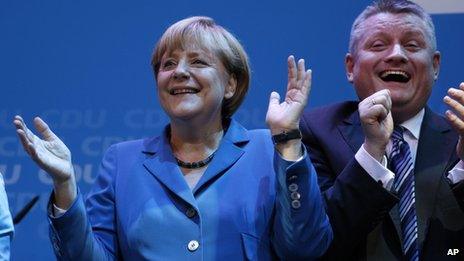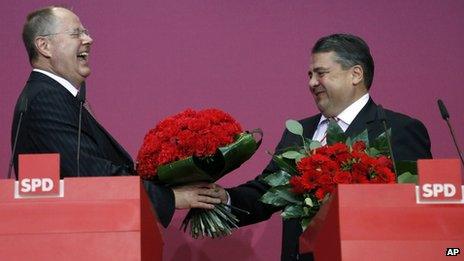German election: The era of Angela Merkel
- Published
- comments

When Angela Merkel walked into her party's headquarters in Berlin on Sunday evening she was greeted with adulation.
It was not just the campaign cries of "Angie, Angie", it was to witness a politician in a moment of personal triumph. Her smile was broad and unrestrained. The campaign had been built around her personality and it was her victory.
She had given her party its best result in 20 years. One German paper declared: "Germany is now conclusively Angela Merkel territory." In terms of power, Frau Europa has no equals on the continent.
Her victory was, at root, a vote of thanks for her calm steady leadership through the eurozone crisis.
The woman who is often referred to as "Mutti" - "Mummy" - had acted as a protector of German interests. She had saved the German tax-payer from becoming the paymaster for the rest of Europe.
Under her leadership eurozone countries which embraced reforms were rescued, but she resisted moves to turn the European Union into a transfer union in which German money flowed south. At the same time, the German economy delivered the lowest unemployment for two decades.
And yet she finds herself in a difficult position. Her coalition partners, the pro-market Free Democrats, failed to win enough votes to qualify for seats in parliament. It leaves Angela Merkel's conservatives just shy of an absolute majority.
A single-party absolute majority has not been achieved since 1957. It would have been a historic achievement, but it would have left her vulnerable to some of the eurosceptics within her own party. Narrow majorities greatly increase the influence of back-bench MPs.
European enthusiasm
That is why many of her supporters favour a grand coalition with the opposition Social Democrats. Such an alliance is not without risk. Many of the Social Democrats are wary. They were in coalition with Angela Merkel in 2005 and got little thanks for it. In their view she stole the credit.
They will bargain hard before offering their support. They might insist on taking the post of finance minister or adopting a nationwide minimum wage or higher taxes for the rich.

The prospect of coalition is bittersweet for the Social Democrats
In 2005 they had eight ministries. They would be fortunate to have this amount of influence again.
Elsewhere in Europe, however, there is enthusiasm for a grand coalition. Officials in Brussels see the Social Democrats as softening the chancellor's strategy of insisting on austerity and labour reforms in exchange for helping weaker eurozone countries.
French President Francois Hollande, in particular, is likely to welcome a coalition with the leftist Social Democrats.
In this time of horse trading, soundings will also be put out for a coalition with the Greens. Such a partnership becomes more likely if the demands from the Social Democrats are too exacting.
Eurosceptic force
Some are asking whether the "real" Angela Merkel will now emerge. She will not, in my view, act out of character. Her instinct over Europe is to be cautious and that will not change.
There will be no "soft" third bailout for Greece. A eurozone banking union will emerge step-by-step. The chancellor will tread carefully, hoping to avoid opening up a change to the EU treaties.
She will be mindful of the strong showing of the Eurosceptic party Alternative fuer Deutschland. It did not get enough votes to qualify for seats in parliament. But it damaged the Free Democrats and will serve as a warning to Angela Merkel not to allow euro-scepticism to grow in Germany.
The success of Mrs Merkel will be welcomed by David Cameron. If he is to successfully renegotiate the terms of the UK's relationship with Europe, he will have to do it with her help.
The German chancellor has hinted, rather vaguely, that some powers can be returned from Brussels to the nation states. However a grand coalition will be less welcomed in London, as the SPD has already said "there should be no special deals for anyone".
The German Finance Minister, Wolfgang Schaeuble says that Germany will continue to be Europe's economic "anchor".
It will act as role model rather than leader. Berlin will remain wary of it becoming a German Europe rather than a Europe with Germany at the heart of it.
But nothing significant can happen in Europe without Angela Merkel's agreement. Whatever the checks and balances, she is Europe's dominant politician. She is committed to the survival of the European project and its currency, but no-one is any clearer as to what kind of Europe she envisages.
Disguising her hand - which she learnt growing up under communism in East Germany - has served her well and is unlikely to change as she embarks on her third term.